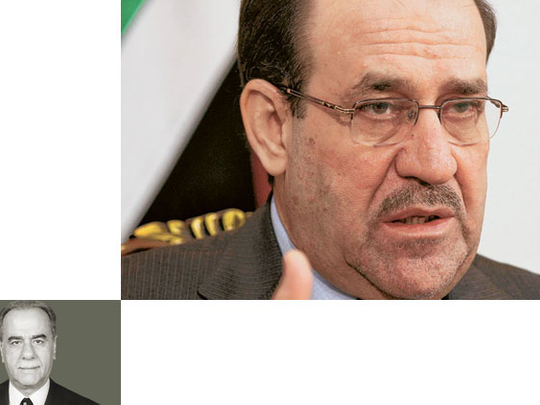
With the US forces’ pullout during the last month of 2011, the Iraqi political process entered a new phase of internal strife. These new struggles were agitated to settle scores between political leaderships that have coordinated together on the surface in what is known as the Iraqi national partnership government.
Since then, the Iraqi political crisis has escalated in sharpness and depth, while the chances for coordinative solutions are always falling behind.
The Iraqi political scene is getting more complicated and dim as people’s sufferings and anger increase against the political crisis makers who insist on ignoring their needs and demands.
The axis of political conflict in Iraq is not stable.
After the central stage struggle and differences between Prime Minister Nouri Al Maliki and Ayad Alawi, Chairman of the Al Iraqiya List since the elections of 2010, the importance of this struggle dropped to second place in a more profound clash that is threatening the future and unity of the country.
Today, the axis of conflict between Al Maliki and Masoud Barzani, the President of the Iraqi Kurdistan Region, has become more important. However, the clashes and differences are not between the Kurdish Alliance and the Iraqi National Alliance, as all the counterparts of both these alliances are fragmented and in a certain degree of disagreement amongst themselves over this issue or that.
The conflict interfaces are numerous, such as Al Maliki’s dictatorship inclinations, the oil and gas law, the Constitution’s item 140, the disputed lands, arming the Iraqi forces, arming the Kurdish Peshmerga forces, the region’s budget, and the region’s right to export oil to Turkey, to mention only a few as the list extends further.
The hawks of this conflict are many especially in the media; however the two prominent and central figures are Al Maliki and Barzani themselves. Moreover, both men are no longer keen on hiding their sentiments towards one another in a diplomatic manner.
The most prominent feature of this conflict can be seen through inflating the points of disagreement and holding onto the differences that will never allow for a bargain or agreement, as though both parties are intentionally pushing the crisis towards a point of eruption.
The danger in this situation lies in the fact that both parties have trenched themselves behind barracks which accumulated over a stretch of long years during the past and yielded conflicts of blood throughout Iraq’s history.
The procedures which Baghdad is keen on applying enhances the authority of the central government, while the decisions taken in Erbil in the Kurdish region contradicts that and works on giving the Kurdish province a distinct existence which is far removed from the central government.
The question is: does the federal democratic system in Iraq as defined in the Constitution allow for such contradictions?
Both parties use and depend the same Constitution which is un-central in its nature and allows the establishment of provinces, enhances local administration authorities over the central authority, and has many loop holes that allow different and clashing interpretations.
Signs of resolving the conflict started at the Erbil meetings which were followed by the Najaf meeting and another Erbil meeting afterwards to make a vote of no confidence against Al Maliki which in turn was the severest stance he faced since his taking office six years ago.
And despite the fact that the procedure was completely constitutional and in the democratic context of running governments, the novelty of democracy in Iraq and the absence of true and sincere intentions marred the preparations for the procedure itself.
Amidst these clashes, Al Maliki issued a number of decisions for the return of old army officers to the military in a number of governorates, despite the fact that this step had to be taken years ago to prepare for the national reconciliation atmosphere in the country.
Making this decision at this time was interpreted by Barazani as a clear threat message from Al Maliki.
The Kurdish doubts were further enhanced by Baghdad’s deployment of army troops in tactical dimension areas as a step towards moving these troops once a political decision is taken by Baghdad.
The differences over the Constitution’s item 140 and the disputed lands are not new and have not reached the point of eruption over the past few years since the referendum for the Constitution in 2005.
However, the essence of the current struggle is about the Kurdish Province’s exporting oil to turkey and its intentions to sign agreements outside the central Iraqi Ministry of Oil.
Baghdad considers this step as a breach of both the Iraqi sovereignty and its Constitution and has refused it completely.
This topic has become the current axis of the struggle between Baghdad and Erbil to the extent that the Iraqi government asked US President Barak Obama to interfere with ExxonMobil to freeze their oil contracts with the Kurdish Province.
This move was accompanied by a tide of media campaigns against Turkey because of its cooperation with the Kurds and their ignoring the central government. The Iraqi Deputy Prime Minister for Energy also said that Turkey was making a blatant attack against Iraq’s oil wealth.
The fall of the no-confidence motion against Al Maliki has enhanced his position, but it did not weaken Barzani’s position. It only curbed his offensive capabilities.
The Kurdish province’s oil policy will not change unless ExxonMobil buckles down under the political pressure exerted.
Consequently, the province sees that it has a constitutional right to use its natural resources, but Baghdad is of an entirely different opinion, especially as the ExxonMobil oil contracts covered oil fields outside the Kurdish province as well.
The conflict between Baghdad and Erbil shall witness further escalations in the future.
Dr Mohammad Akef Jamal is an Iraqi writer based in Dubai.










